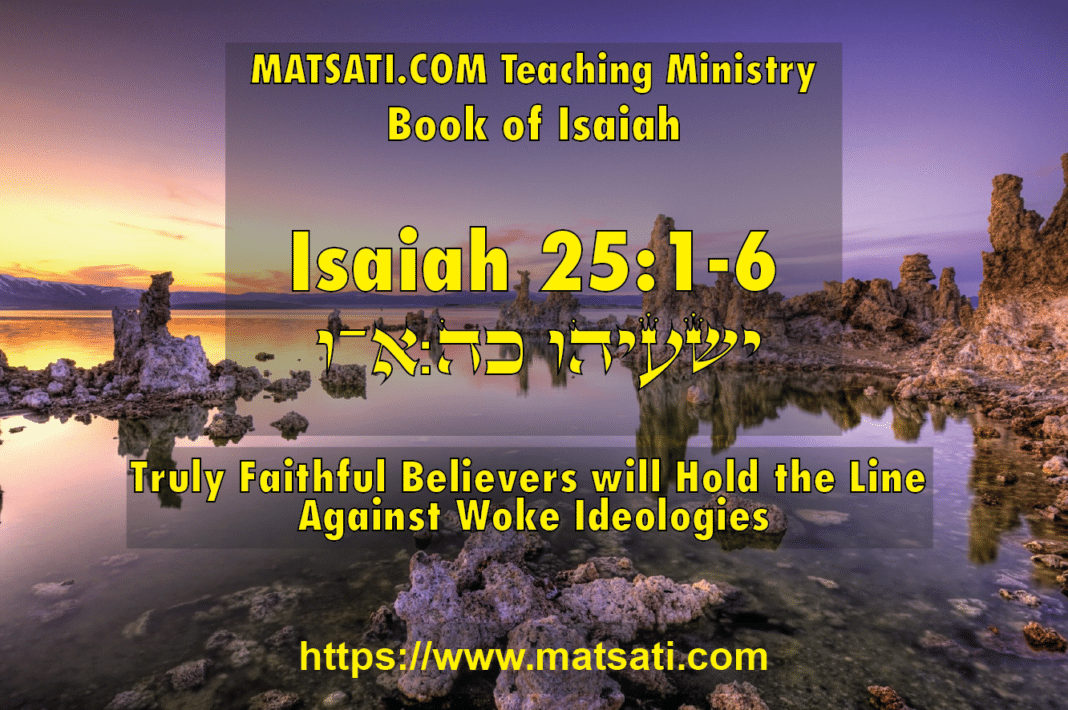Isaiah 25:1-6
Isaiah chapter 25, commentators say this is the response to chapter 24. Chapter 25 can be broken down in the following way: (i) a song of thanksgiving for God’s faithfulness in delivering His people (Isaiah 25:1-5), and (ii) the explanation that God’s purpose for the destruction of the earth is the redemption of the earth from death (Isaiah 25:6-12). The joy that is being expressed here in Isaiah 25:1-12 is in the people’s deliverance from their enemies which is typified in Moab. This follows through from the historical perspective, that God brings disaster for the purpose of drawing men back to repentance and turning from sin and to walk in His holy ways. The commentaries have Isaiah either looking back at the deliverance that has occurred, or looking forward prophetically speaking of the future deliverance. The outcome of these events of devastation, are meant for the people to humbly acknowledge the sovereign authority of God over all the earth. These events establish that there are no limits to the rule of God. He is sovereign over all the earth and provides us with the proper reverence and level of respect we should have towards God in heaven. The sovereignty of God is expressed by Isaiah according to Isaiah 45:6-7.

ספר ישעיה פרק מה
ו לְמַעַן יֵדְעוּ מִמִּזְרַח-שֶׁמֶשׁ וּמִמַּעֲרָבָה כִּי-אֶפֶס בִּלְעָדָי אֲנִי יְהֹוָה וְאֵין עוֹד: ז יוֹצֵר אוֹר וּבוֹרֵא חֹשֶׁךְ עֹשֶֹה שָׁלוֹם וּבוֹרֵא רָע אֲנִי יְהֹוָה עֹשֶֹה כָל-אֵלֶּה:
Isaiah 45:6-7
45:6 That they may know from the rising of the sun, and from the west, That there is none beside me. I am the LORD, and there is none else. 45:7 I form the light, and create darkness: I make peace, and create evil: I the LORD do all these things. (KJV)
We had discussed this verse previously in the study titled “Death on a Massive Scale, Everyone is Ignoring the Warning Signs, ישעיהו כא:א-ט / Isaiah 21,1-9” It is highly likely that this is the source text (Isaiah 45:6-7) for the Jewish prayer that includes a blessing that recalls God’s absolute power over all the universe.

Notice how the rendering of this prayer parallels that of the Isaiah text. We note that the prayer removes the part about God creating evil or calamity itself. The traditional blessing states that God יוֹצֵר אוֹר וּבוֹרֵא חֹשֶׁךְ formed the light and created darkness. There is a significant contrast here, light and dark. These things are true based upon what we are reading according to the book of Isaiah thus far. The Isaiah text writes, עֹשֶֹה שָׁלוֹם וּבוֹרֵא רָע that God “makes peace and creates evil/calamity” which indicates that the Lord is in fact sovereign over all! The blessing ends saying ובורא את הכל “I create all” paralleling אֲנִי יְהֹוָה עֹשֶֹה כָל-אֵלֶּה “I am the Lord maker of all these things.” It is these verses from Isaiah that Paul draws upon in his discourse to the Romans according to Romans 9:18-21.
Romans 9:18-24
9:18 Therefore hath he mercy on whom he will have mercy, and whom he will he hardeneth. 9:19 Thou wilt say then unto me, Why doth he yet find fault? For who hath resisted his will? 9:20 Nay but, O man, who art thou that repliest against God? Shall the thing formed say to him that formed it, Why hast thou made me thus? 9:21 Hath not the potter power over the clay, of the same lump to make one vessel unto honor, and another unto dishonor? 9:22 What if God, willing to shew his wrath, and to make his power known, endured with much longsuffering the vessels of wrath fitted to destruction: 9:23 And that he might make known the riches of his glory on the vessels of mercy, which he had afore prepared unto glory, 9:24 Even us, whom he hath called, not of the Jews only, but also of the Gentiles? (KJV, ܡܳܕ݂ܶܝܢ ܥܰܠ ܡܰܢ ܕ݁ܨܴܒ݂ܶܐ ܗ̄ܘ ܡܪܱܚܶܡ ܆ ܘܥܰܠ ܡܰܢ ܕ݁ܨܴܒ݂ܶܐ ܡܩܰܫܶܐ ܂ܘܰܟ݂ܒ݂ܰܪ ܬܻ݁ܐܡܰܪ ܆ ܕܱ݁ܠܡܳܢܳܐ ܪܴܫܶܐ ܂ ܡܰܢܽܘ ܓܷ݁ܝܪ ܕܱ݁ܢܩܽܘܡ ܠܾܘܩܒ݂ܰܠ ܨܷܒ݂ܝܳܢܶܗ ܂ ܐܱܢ̄ܬ݁ ܗܳܟ݂ܺܝܠ ܡܰܢ ܐܱܢ̄ܬ݁ ܐܴܘ ܒܱ݁ܪܢܳܫܳܐ ܇ ܕ݁ܦ݂ܶܬ݂ܓ݂ܳܡܳܐ ܠܱܐܠܴܗܳܐ ܝܳܗܶܒ݂ ܐܱܢ̄ܬ݁ ܂ ܕܱ݁ܠܡܳܐ ܐܴܡܪܴܐ ܓ݁ܒ݂ܺܝܠܬܴ݁ܐ ܠܡܰܢ ܕ݁ܓ݂ܰܒ݂ܠܴܗ ܕܱ݁ܠܡܳܢܳܐ ܗܳܟ݂ܰܢܳܐ ܓ݁ܒ݂ܰܠܬܴ݁ܢܝ ܂ ܐܱܘ ܠܴܐ ܫܰܠܻܝܛ ܦܱ݁ܚܳܪܴܐ ܥܰܠ ܛܻܝܢܶܗ ܇ ܕ݁ܡܶܢܳܗ ܡܶܢ ܓ݁ܒ݂ܺܝܠܬܴ݁ܐ ܢܶܥܒܷ݁ܕ݂ ܡܳܐܢܷ̈ܐ ܇ ܚܰܕ݂ ܠܻܐܝܩܳܪܴܐ ܂ ܘܚܰܕ݂ ܠܨܱܥܪܴܐ ܂ ܐܷܢ ܕܷ݁ܝܢ ܨܒ݂ܳܐ ܐܱܠܴܗܳܐ ܕܱ݁ܢܚܰܘܶܐ ܪܾܘܓ݂ܙܶܗ ܂ ܘܢܰܘܕܱ݁ܥ ܚܰܝܠܷܗ ܆ ܐܱܝܬܻ݁ܝ ܒ݁ܣܽܘܓ݂ܳܐܐ ܕ݁ܡܰܓ݁ܪܱܬ݂ ܪܾܘܚܶܗ ܪܾܘܓ݂ܙܳܐ ܇ ܥܰܠ ܡܳܐܢܷ̈ܐ ܕ݁ܪܾܘܓ݂ܙܳܐ ܕܱ݁ܓ݂ܡܺܝܪܻܝܢ ܠܱܐܒ݂ܕ݂ܳܢܳܐ ܆ ܘܰܐܫܦܱ݁ܥ ܪܱ̈ܚܡܰܘܗ̄ܝ ܥܰܠ ܡܳܐܢܷ̈ܐ ܕ݁ܪܱ̈ܚܡܶܐ ܂ ܕܱ݁ܡܛܱܝܒ݂ܺܝܢ ܗ̄ܘܰܘ ܠܱܐܠܴܗܳܐ ܠܬ݂ܷܫܒܾ݁ܘܚܬܴ݁ܐ ܂ ܕܻ݁ܐܝܬ݂ܱܝܢ ܚ̄ܢܰܢ ܩܪܱ̈ܝܳܐ ܆ ܠܴܐ ܗ̄ܘܳܐ ܒܱ݁ܠܚܽܘܕ݂ ܡܶܢ ܝܺܗܽܘܕ݂ܳܝܷ̈ܐ ܇ ܐܷܠܴܐ ܐܴܦ݂ ܡܶܢ ܥܰܡ̄ܡܷ̈ܐ ܂ 18 ἄρα οὖν ὃν θέλει ⸆ ἐλεεῖ, ὃν δὲ θέλει σκληρύνει. 19 Ἐρεῖς μοι οὖν·* τί °[οὖν] ἔτι μέμφεται; τῷ γὰρ βουλήματι αὐτοῦ τίς ἀνθέστηκεν*; 20 ⸂ὦ ἄνθρωπε, μενοῦνγε⸃ σὺ τίς εἶ ὁ ἀνταποκρινόμενος τῷ θεῷ; μὴ ἐρεῖ τὸ πλάσμα τῷ πλάσαντι·* τί με ⸀ἐποίησας οὕτως*; 21 ἢ οὐκ ἔχει ἐξουσίαν ὁ κεραμεὺς τοῦ πηλοῦ ἐκ τοῦ αὐτοῦ φυράματος ποιῆσαι ὃ μὲν εἰς τιμὴν σκεῦος ὃ δὲ εἰς ἀτιμίαν*; 22 εἰ δὲ θέλων ὁ θεὸς ἐνδείξασθαι τὴν ὀργὴν καὶ γνωρίσαι τὸ δυνατὸν αὐτοῦ °ἤνεγκεν ἐν πολλῇ μακροθυμίᾳ ⸆ σκεύη ὀργῆς κατηρτισμένα εἰς ἀπώλειαν*, 23 °καὶ ἵνα γνωρίσῃ τὸν πλοῦτον τῆς ⸀δόξης αὐτοῦ ἐπὶ σκεύη ἐλέους ἃ προητοίμασεν εἰς δόξαν*; 24 Οὓς καὶ ἐκάλεσεν ἡμᾶς οὐ μόνον ἐξ Ἰουδαίων ἀλλὰ καὶ ἐξ ἐθνῶν)
Paul’s understanding is drawn right from the pages of Isaiah. The idea is that God is sovereign over all, including evil. We note in the prayer יי אלהינו מלך העולם “The Lord our God, King of the Universe” illustrates this point. We know that God is not the author of moral evil (read James 1:13), and so the translation in more modern bibles have updated the KJV “evil” to “calamity” to qualify this point that James makes in his epistle. So the idea is that עֹשֶֹה שָׁלוֹם וּבוֹרֵא רָע here רָע is being contrasted with שָׁלוֹם which suggests what we are reading in the text, that calamity or disaster are the outcomes of sin and sinfulness and is consistent with Torah on Devarim / Deuteronomy 28. The point of these things is in the idea of evil in this world, and God’s sovereign authority overall. We remember how Judas betrayed Yeshua, this was foreseen (Tehillim / Psalms 41:9, Mark 14:17-18, Acts 2:23), and how we ask questions like Job did, not knowing the underlying spiritual perspective, regardless of how we understand these things or the events of our lives, we are confident of the goodness of God and His love for us! The resurrection of Yeshua demonstrated that love, and the power of God to overcome the forces of evil in the curse of death. This is how the prophet Isaiah is seeing the future events, that of coming destruction (Isaiah 24) and then that of the deliverance of the people (Isaiah 25). We note this consistent theme here of God acting as a part of the process of redemption, that He will display His power and be crowned king over all! The effect of these things is realizing how we are to respond to the Lord, in joy and love, this seems to be the point of Isaiah 25. When we are told to listen to the voice of God, we do so today through the pages of the Scriptures. The scriptures provide us with an overarching perspective how God loves us and sent His son to die for our sins! According to the NT text, Yeshua is indeed the Messiah of God (Matthew 1:1, John 4:25-26, etc), He is the good shepherd (John 10:11), and does the will of the Father in heaven in whom God delights (John 8:29). Yeshua is the one who rebuilds the temple that is not made with human hands (Mark 14:58, John 2:21, 1 Corinthians 6:19, 2 Corinthians 6:16, Ephesians 2:21, etc) and Yeshua is called the True Foundation stone of God as the focus of our praise in the deliverance of God through faith in Him (1 Corinthians 3:11). These things reveal to us how the Lord God Almighty, our Father in heaven brought Yeshua as His Messiah, and so we should listen to what he has to say according to the Scriptures.
Isaiah opens by saying the following according to Isaiah 25:1.
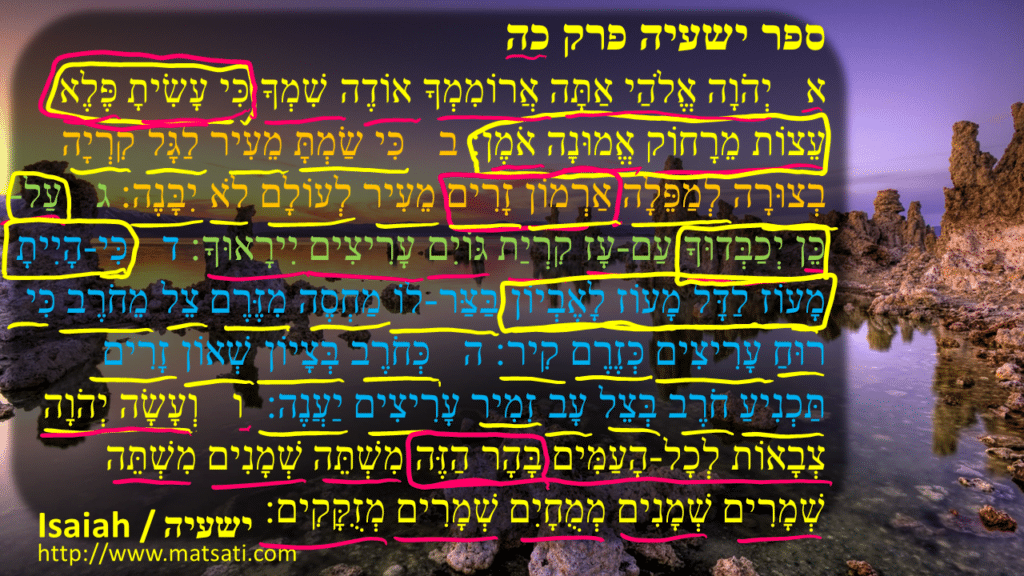
ספר ישעיה פרק כה
א יְהֹוָה אֱלֹהַי אַתָּה אֲרוֹמִמְךָ אוֹדֶה שִׁמְךָ כִּי עָשִֹיתָ פֶּלֶא עֵצוֹת מֵרָחוֹק אֱמוּנָה אֹמֶן:
Isaiah 25:1 states, “O Lord, thou art my God; I will exalt thee, I will praise thy name; (יְהֹוָה אֱלֹהַי אַתָּה אֲרוֹמִמְךָ אוֹדֶה שִׁמְךָ) for thou hast done wonderful things; thy counsels of old are faithfulness and truth. (כִּי עָשִֹיתָ פֶּלֶא עֵצוֹת מֵרָחוֹק אֱמוּנָה אֹמֶן)” Here is a very personal affirmation of who God is, and the reasons why he should be praised כִּי עָשִֹיתָ פֶּלֶא עֵצוֹת מֵרָחוֹק אֱמוּנָה אֹמֶן “for thou hast done wonderful things; thy counsels of old are faithfulness and truth.” When the ravenous drinking ceases (see Isaiah 24:1-17) only then is it possible to recognize the glory of God, His Mercy, His Grace, His triumph over all, and how much He loves us! We note the promises that God gives us according to the Torah. One of those promises is that of His nearness! Parashat Vayigash (ויגש) means “and he drew near” taken from the verb (נגש) meaning “to approach, draw near, to join.” The Torah portion describes how Judah drew near to his brother Joseph to intercede on behalf of his family. According to the Torah, the word נגש is used in various ways. Take for example Bereshit / Genesis 18:23 from Parashat Vayera.
ספר בראשית פרק יח
כג וַיִּגַּשׁ אַבְרָהָם וַיֹּאמַר הַאַף תִּסְפֶּה צַדִּיק עִם-רָשָׁע:LXX on Genesis 18:23
23 καὶ ἐγγίσας Αβρααμ εἶπεν Μὴ συναπολέσῃς δίκαιον μετὰ ἀσεβοῦς καὶ ἔσται ὁ δίκαιος ὡς ὁ ἀσεβής;Bereshit / Genesis 18:23
18:23 And Abraham drew near, and said, Wilt thou also destroy the righteous with the wicked? (KJV)
We note how Abraham is said to have drawn near to the Lord to ask a question “will You destroy the righteous with the wicked?” This provides us with a perspective on faith, and the faithfulness of God in His promise to draw near to us if we draw near to Him! We note in the Shema (Devarim / Deuteronomy 6:4-5) we are to draw near to God with “all our heart” and not merely with “religious ideology” or the “correct words” and such. The reason this is so important, is to understand how the history of Israel reveals that there are many who merely draw near with their mouth to honor God with their lips, while their heart is far from Him. (Isaiah 29:13) We note what God says according to Isaiah 29:14.
ספר ישעיה פרק כט
יד לָכֵן הִנְנִי יוֹסִף לְהַפְלִיא אֶת-הָעָם-הַזֶּה הַפְלֵא וָפֶלֶא וְאָבְדָה חָכְמַת חֲכָמָיו וּבִינַת נְבֹנָיו תִּסְתַּתָּר:Isaiah 29:14
29:14 Therefore, behold, I will proceed to do a marvelous work among this people, Even a marvelous work and a wonder: For the wisdom of their wise men shall perish, And the understanding of their prudent men shall be hid. (KJV)
The Lord God said that He will do wonderful things with his people and even do marvelous work and wonder. The key point is that we must draw near in order for the Spirit of God, the Spirit of Truth to work powerfully in our lives. The act of drawing near is achieved through the study of the Scriptures and prayer! I would go as far to say that the Lord is with us each day as we go through the day, and so when we apply God’s word to our lives, He is there with us! We also note that simply the reading of the scriptures alone is not effective to bring us into close contact with the Lord. We have to have the proper Kavanah, the proper intention, with prayer and intent and expectation of hearing from God, this is the key to drawing near! We note something about the translators of the LXX. They always used the word ἐγγίσας for the verb נגש. This Greek word interestingly has a range of meanings similar to נגש however it generally means “to touch something.” This may seem a bit inconsequential, until we realize that this verb is brought over into the NT text and reveals to us a good number of things.
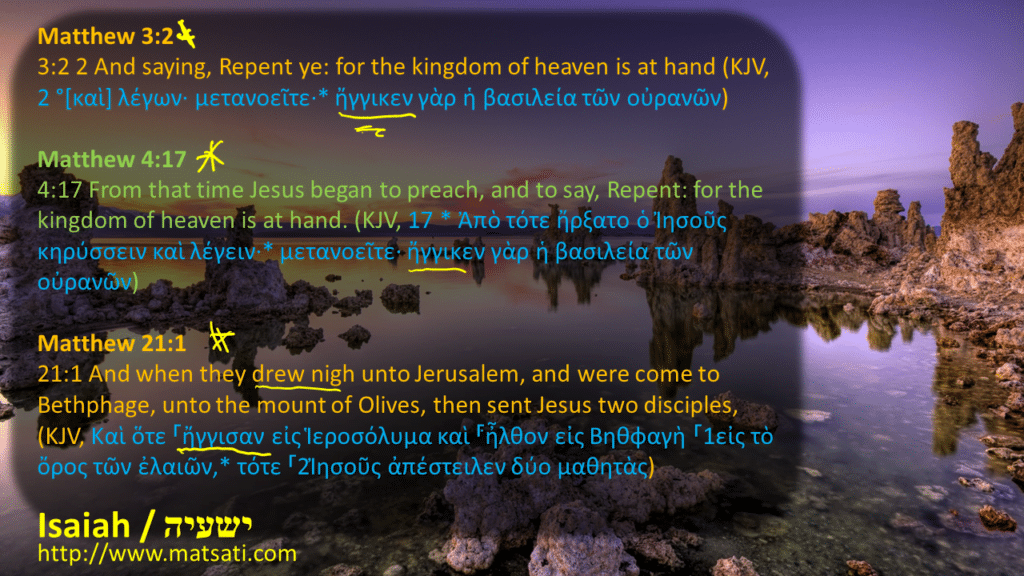
Matthew 3:2
3:2 2 And saying, Repent ye: for the kingdom of heaven is at hand (KJV, 2 °[καὶ] λέγων· μετανοεῖτε·* ἤγγικεν γὰρ ἡ βασιλεία τῶν οὐρανῶν)
Matthew 4:17
4:17 From that time Jesus began to preach, and to say, Repent: for the kingdom of heaven is at hand. (KJV, 17 * Ἀπὸ τότε ἤρξατο ὁ Ἰησοῦς κηρύσσειν καὶ λέγειν·* μετανοεῖτε· ἤγγικεν γὰρ ἡ βασιλεία τῶν οὐρανῶν)
Matthew 21:1
21:1 And when they drew nigh unto Jerusalem, and were come to Bethphage, unto the mount of Olives, then sent Jesus two disciples, (KJV, Καὶ ὅτε ⸀ἤγγισαν εἰς Ἱεροσόλυμα καὶ ⸁ἦλθον εἰς Βηθφαγὴ ⸀1εἰς τὸ ὄρος τῶν ἐλαιῶν,* τότε ⸀2Ἰησοῦς ἀπέστειλεν δύο μαθητὰς)
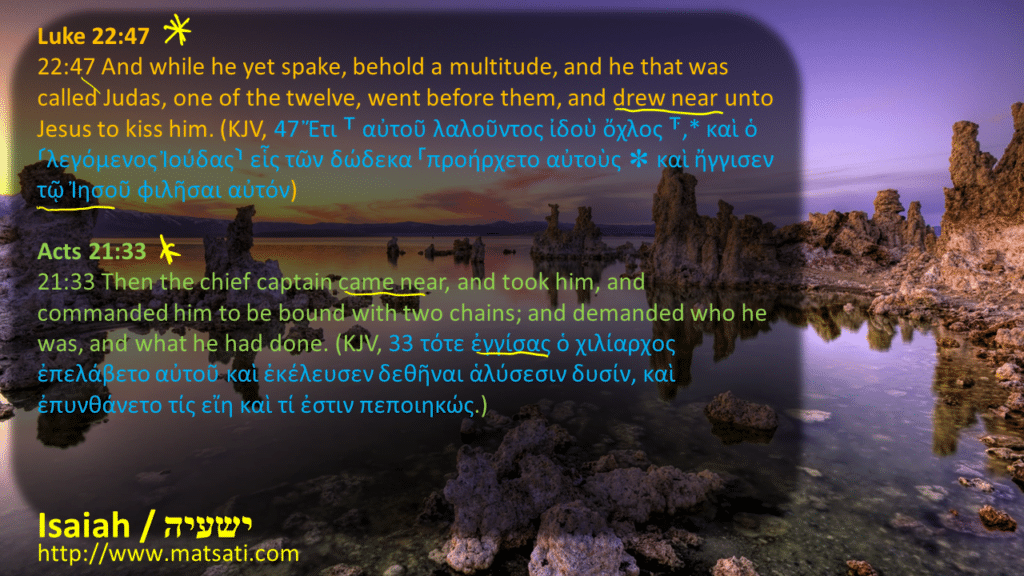
Luke 22:47
22:47 And while he yet spake, behold a multitude, and he that was called Judas, one of the twelve, went before them, and drew near unto Jesus to kiss him. (KJV, 47 Ἔτι ⸆ αὐτοῦ λαλοῦντος ἰδοὺ ὄχλος ⸇,* καὶ ὁ ⸂λεγόμενος Ἰούδας⸃ εἷς τῶν δώδεκα ⸀προήρχετο αὐτοὺς ✽ καὶ ἤγγισεν τῷ Ἰησοῦ φιλῆσαι αὐτόν)
Acts 21:33
21:33 Then the chief captain came near, and took him, and commanded him to be bound with two chains; and demanded who he was, and what he had done. (KJV, 33 τότε ἐγγίσας ὁ χιλίαρχος ἐπελάβετο αὐτοῦ καὶ ἐκέλευσεν δεθῆναι ἁλύσεσιν δυσίν, καὶ ἐπυνθάνετο τίς εἴη καὶ τί ἐστιν πεποιηκώς.)
We note from this selection of verses, that this word ἐγγίσας is used to describe how the kingdom of Heaven is at hand (see Matthew 3:2 and 4:17). The disciples drew near to the city of Jerusalem (Matthew 21:1). Judas drew near to kiss the Messiah Yeshua (Luke 22:47). The chief captain of the Roman legion drew near and arrested Paul (Acts 21:33). James also used the verb in the following way:
James 4:8
4:8 Draw nigh to God, and he will draw nigh to you. Cleanse your hands, ye sinners; and purify your hearts, ye double minded. (KJV, 8 ἐγγίσατε τῷ θεῷ καὶ ἐγγιεῖ ὑμῖν.* καθαρίσατε χεῖρας, ἁμαρτωλοί, καὶ ἁγνίσατε καρδίας, δίψυχοι.)
James understood the Torah perspective when he wrote ἐγγίσατε τῷ θεῷ καὶ ἐγγιεῖ ὑμῖν “draw near to God and He will draw near to you.” Notice how the act of drawing near can have many approaches, such as for holiness and truth to seek the counsel of God (Bereshit / Genesis 18:23, Matthew 3:2 and 4:17), or for deception as in the case of Judas (Luke 22:47), or in criminal matters as in the case with Paul (Acts 21:23), etc. The attempt to draw near has no effect unless one has the proper Kavanah (intention)! The Scriptures tell us that God is not distant from us such that we need to shout or repeat our words in order for Him to hear us. He is close enough to touch, in fact His presence fills all the earth (Isaiah 6:3). This is the perspective of faith, to trust in the Word of God, to draw near expecting to hear from Him, and to do so through studying God’s Word, and through prayer and praise! David wrote of this according to Tehillim / Psalms 16:8 saying, “I am ever mindful of the Lord’s presence; because He is my right hand; I shall never be shaken.” The Scriptures describe how God invites us to come to Him, to seek Him out, and to draw near! He wants to know us and wants for us to know Him! The major takeaway is that if we draw near to God, He will draw near to us, and we have access to our Father directly through faith in His Son Yeshua the Messiah! The modern church has stripped God of his miraculous powers and developed more of a Psycho-Physico-Social system as opposed to the Scriptural imperative to draw near and humble our lives! This kind of environment neither excites nor deserves the kind of ecstatic praise recorded here in Isaiah 25:1. The Lord seeks for us all to be a part of God’s Kingdom in power and in truth! Isaiah describes a God who is all powerful, who is consistent, faithful, and true, the creator of all things, and the one who loves us dearly! It is from this perspective that Isaiah takes his point of view, and should be the perspective that we have, to live our lives for the glory of God!
Isaiah goes on saying the following according to Isaiah 25:2.
ספר ישעיה פרק כה
ב כִּי שַֹמְתָּ מֵעִיר לַגָּל קִרְיָה בְצוּרָה לְמַפֵּלָה אַרְמוֹן זָרִים מֵעִיר לְעוֹלָם לֹא יִבָּנֶה:
Isaiah 25:2 states, “For thou hast made of a city an heap; of a defenced city a ruin: a palace of strangers to be no city; it shall never be built. (כִּי שַֹמְתָּ מֵעִיר לַגָּל קִרְיָה בְצוּרָה לְמַפֵּלָה אַרְמוֹן זָרִים מֵעִיר לְעוֹלָם לֹא יִבָּנֶה)” The sentence can be broken down in the following way:
כִּ֣י שַׂ֤מְתָּ מֵעִיר֙ לַגָּ֔ל
“For you have placed a city to be a heap”
קִרְיָ֥ה בְצוּרָ֖ה לְמַפֵּלָ֑ה
“A fortified city to be a ruin”
אַרְמֹ֤ון זָרִים֙ מֵעִ֔יר לְעֹולָ֖ם לֹ֥א יִבָּנֶֽה׃
“a tower of strangers from a city, forever not to be built”
Here Isaiah says that the Lord God will make the city a heap and a ruin. We note that the walls and the gate of the city are its source of strength and power. When an invading nation cannot enter due to these things (the walls and gate) the people become proud. We note that Mishley / Proverbs 18:11 states, “The wealth of the rich is their fortified city; they imagine it a wall too high to scale.” (NIV) The rich man imagines his wealth to be, as it were, an unassailable defense, to preserve him and keep him safe amid all the storms of life illustrated here in the strong city. We note also according to Mishley / Proverbs 10:15 הֹ֣ון עָ֭שִׁיר קִרְיַ֣ת עֻזֹּ֑ו מְחִתַּ֖ת דַּלִּ֣ים רֵישָֽׁם׃ “The rich man’s wealth is his strong city; the destruction of the poor is their poverty.” Pride has the opposite effect of what God’s word does in His people to live humbly, in holiness, righteousness, and truth. We also note Mishley / Proverbs 18:12 לִפְנֵי־שֶׁ֭בֶר יִגְבַּ֣הּ לֵב־אִ֑ישׁ וְלִפְנֵ֖י כָבֹ֣וד עֲנָוָֽה׃ “Before his downfall a man’s heart is proud, but humility comes before honor.” The solution to this is what we read according to the Torah perspective, God said according to Vayikra / Leviticus 11:44 the following:
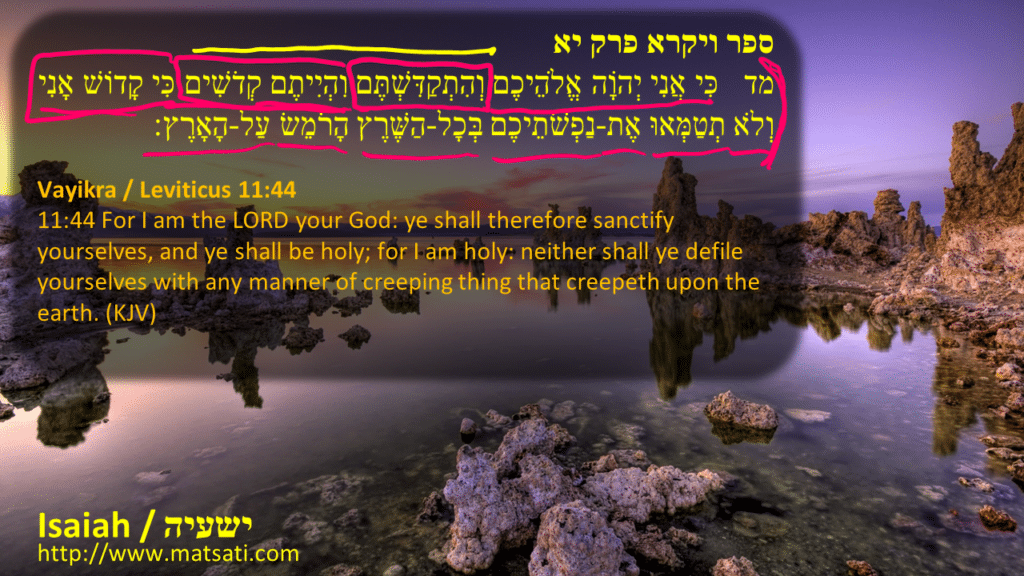
ספר ויקרא פרק יא
מד כִּי אֲנִי יְהוָֹה אֱלֹהֵיכֶם וְהִתְקַדִּשְׁתֶּם וִהְיִיתֶם קְדֹשִׁים כִּי קָדוֹשׁ אָנִי וְלֹא תְטַמְּאוּ אֶת-נַפְשֹׁתֵיכֶם בְּכָל-הַשֶּׁרֶץ הָרֹמֵשֹ עַל-הָאָרֶץ:
Vayikra / Leviticus 11:44
11:44 For I am the LORD your God: ye shall therefore sanctify yourselves, and ye shall be holy; for I am holy: neither shall ye defile yourselves with any manner of creeping thing that creepeth upon the earth. (KJV)
Here the Lord God states, וְהִתְקַדִּשְׁתֶּם וִהְיִיתֶם קְדֹשִׁים “Sanctify yourselves and you will be holy.” Many times the Lord speaks on the importance of sanctifying oneself (Vayikra / Leviticus 11:44, 20:7, Bamidbar / Numbers 11:18, Joshua 3:5, 7:13, 1 Samuel 16:5, 1 Chronicles 15:12, 2 Chronicles 29:5, 30:8, 35:6). We note this is related to how we live our lives here on earth. The NT text writes “Let us not grow weary of doing good, for in due season we all reap, if we do not give up” (Galatians 6:9) and “Draw near to God and He will draw near to you.” (James 4:4, Hebrews 11:6) In order to do these things, to serve the Lord, we are to be humble in all the works that are done for the glory of God. So, the idea here is not necessary concerning a particular city but refers to all of those who set themselves up arrogantly believing themselves to be powerful. These are those who hate righteousness and persecute God’s children. We remember however that the Lord God in heaven will prevail and triumph. This has been planned from the very beginning!
Isaiah goes on saying the following according to Isaiah 25:3.
ספר ישעיה פרק כה
ג עַל-כֵּן יְכַבְּדוּךָ עַם-עָז קִרְיַת גּוֹיִם עָרִיצִים יִירָאוּךָ:
Isaiah 25:3 states, “Therefore shall the strong people glorify thee, the city of the terrible nations shall fear thee. (עַל-כֵּן יְכַבְּדוּךָ עַם-עָז קִרְיַת גּוֹיִם עָרִיצִים יִירָאוּךָ)” Here the Hebrew Bible writes עַל-כֵּן יְכַבְּדוּךָ עַם-עָז “thus the strong people you will glorify.” A text comparison of the LXX, MSS, TgJ, and L-Peshitta shows the following:
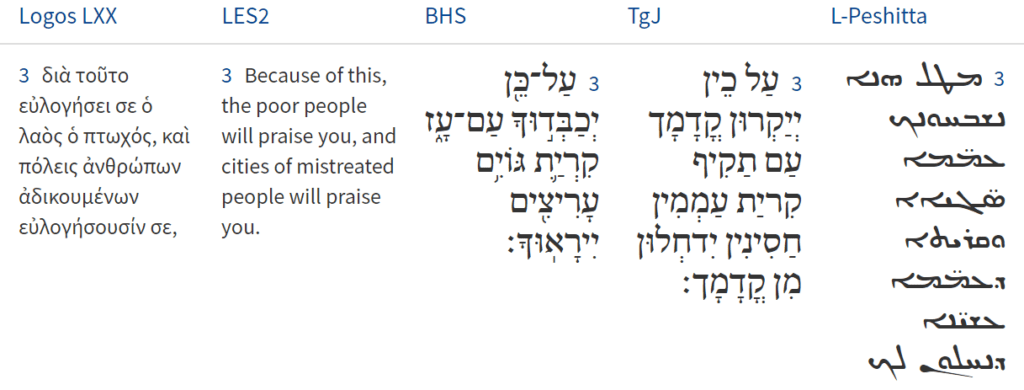
According to the Septuagint (LXX) the translators translate the Hebrew יְכַבְּדוּךָ using the Greek word εὐλογήσει which means “to exalt” or “bless, praise.”
What does it mean to exalt the Lord God Almighty?
What does it mean to bless or praise the Lord God who is in heaven?
These are good questions! To exalt the Lord means to rise up to a position of honor. How does one raise up the name of the Lord to a position of honor? We exalt the Lord because he is worthy to be exalted but we don’t do this only by giving Him lip service! We exalt the name of God through our testimony, to the deeds that we do to bring glory to His Holy Name! This is the major difference between the churches and synagogues that accept LGBTQ or woke ideologies. The truly faithful believers will hold the line standing upon God’s word and standing for the truth against these demonic ideologies. One gives lip service to the Lord, the other actually takes a stand on God’s word and does not water it down! This is why I said earlier how the modern church has stripped God of his miraculous powers, and developed a Psycho-Physico-Social system, something that tickles the ears and schmoozes the flesh, as opposed to the Scriptural imperative to turn from sin, draw near to God, and be humble in our lives standing strong upon God’s Holy Word! If we learn anything from these passages, we are impressed that the major takeaway is that if we draw near to God, He will draw near to us. Note the connection to holiness, which draws with it the proper Kavanah (intention). Isaiah 25:3 goes on saying, קִרְיַת גּוֹיִם עָרִיצִים יִירָאוּךָ “the city of the terrible nations shall fear you.” The fear of the nations is the result of God’s judgment. (Isaiah 17:7-9, 19:19-20, 23:18) Why does the Lord God need to bring judgment upon the world? The reason is that mankind does not recognize anything but power in this world, and the Lord demonstrating His power achieves the effect of waking up the nations to the reality that the Lord is God over all!
Isaiah continues saying according to Isaiah 25:4-5:
ספר ישעיה פרק כה
ד כִּי-הָיִיתָ מָעוֹז לַדָּל מָעוֹז לָאֶבְיוֹן בַּצַּר-לוֹ מַחְסֶה מִזֶּרֶם צֵל מֵחֹרֶב כִּי רוּחַ עָרִיצִים כְּזֶרֶם קִיר: ה כְּחֹרֶב בְּצָיוֹן שְׁאוֹן זָרִים תַּכְנִיעַ חֹרֶב בְּצֵל עָב זְמִיר עָרִיצִים יַעֲנֶה:
Isaiah 25:4 states, “For thou hast been a strength to the poor, a strength to the needy in his distress, a refuge from the storm, a shadow from the heat, when the blast of the terrible ones is as a storm against the wall. (כִּי-הָיִיתָ מָעוֹז לַדָּל מָעוֹז לָאֶבְיוֹן בַּצַּר-לוֹ מַחְסֶה מִזֶּרֶם צֵל מֵחֹרֶב כִּי רוּחַ עָרִיצִים כְּזֶרֶם קִיר)” Isaiah 25:5 “Thou shalt bring down the noise of strangers, as the heat in a dry place; even the heat with the shadow of a cloud: the branch of the terrible ones shall be brought low. (כְּחֹרֶב בְּצָיוֹן שְׁאוֹן זָרִים תַּכְנִיעַ חֹרֶב בְּצֵל עָב זְמִיר עָרִיצִים יַעֲנֶה)” The verse 25:4 appears to parallel verses from the Torah and the Psalms, ie “God is our refuge and strength” (Tehillim / Psalms 46:1-2) The interpretation is that we do not praise and honor God just because of his destruction of the nations, or that He destroyed the palaces of the proud. We praise Him for His being כִּי-הָיִיתָ מָעוֹז לַדָּל מָעוֹז לָאֶבְיוֹן “being a fortress to the poor, a fortress to the needy.” The LXX translates saying ἐγένου γὰρ πάσῃ πόλει ταπεινῇ βοηθὸς “become for every poor city a helper.” This verse expands upon the reason why we give praise to the Lord and honor Him; it is because of who He is as our helper, our refuge, and our strength. The glory we bring to God’s holy name is through the way that we live our lives. The idea of God being a help is a sign of personal involvement in the lives of His people. The various texts in the Tanach, the Torah, Nevi’im, Ketuvim, weave together a picture of who God is, an intimate loving personal Father who watches over us. Isaiah 25:5 follows through from Tehillim / Psalms 37:1-2.
ספר תהילים פרק לז
א לְדָוִד | אַל-תִּתְחַר בַּמְּרֵעִים אַל-תְּקַנֵּא בְּעֹשֵֹי עַוְלָה: ב כִּי כֶחָצִיר מְהֵרָה יִמָּלוּ וּכְיֶרֶק דֶּשֶׁא יִבּוֹלוּן:
Tehillim / Psalms 37:1-2
37:1 To David, Fret not thyself because of evildoers, Neither be thou envious against the workers of iniquity. 37:2 For they shall soon be cut down like the grass, And wither as the green herb. (KJV)
This text describes how the Lord God fights for each of us. This text emphasizes that idea that God’s people are going to see trials and difficulties. The Lord is our stronghold (מָעוֹז) and he is powerful enough to take care of us. Isaiah says זְמִ֥יר עָֽרִיצִ֖ים יַעֲנֶֽה “terrible ones shall be brought low.” Here even though the enemy may seem stronger, we trust by faith in the Lord because He is our source of strength. In addition to the imagery of physical shelter, one also finds the contrasting imagery of light and shadow. While God is referred to as “light” (Tehillim / Psalms 27:1, 84:11, Isaiah 60:16, John 8:12, 9:5, Revelation 21:23) in order to emphasize the illumination, he provides, he is also portrayed as ‘shadow’ or ‘shade’ in order to denote the rest and comfort that he gives (Tehillim / Psalms 91:1, 121:5, Isaiah 25:4). (Zachary Lycans, “God’s Metaphorical Names,” in Lexham Survey of Theology, ed. Mark Ward et al. Bellingham, WA: Lexham Press, 2018).
ספר ישעיה פרק כה
ו וְעָשָֹה יְהֹוָה צְבָאוֹת לְכָל-הָעַמִּים בָּהָר הַזֶּה מִשְׁתֵּה שְׁמָנִים מִשְׁתֵּה שְׁמָרִים שְׁמָנִים מְמֻחָיִם שְׁמָרִים מְזֻקָּקִים:
Isaiah 25:6 states, “And in this mountain shall the LORD of hosts make unto all people a feast of fat things, a feast of wines on the lees, of fat things full of marrow, of wines on the lees well refined. (וְעָשָֹה יְהֹוָה צְבָאוֹת לְכָל-הָעַמִּים בָּהָר הַזֶּה מִשְׁתֵּה שְׁמָנִים מִשְׁתֵּה שְׁמָרִים שְׁמָנִים מְמֻחָיִם שְׁמָרִים מְזֻקָּקִים)” The idea of בָּהָר הַזֶּה “in this mountain” has many allusions: the mountain of Sinai, mount Zion, or one of the other mountains which God has revealed himself (ie. Mount Carmel). The Lord God reveals Himself in a very powerful way, a revelation to the people which leads to a significant change in the direction of those who are faithful after they encounter God. Now something to note is that when we think about having an “encounter” with God, this is not about Him simply raining down something upon us. This is about His being with us! This is illustrated in the Greek word ἐγγίσας to describe the nearness of God and His kingdom (Matthew 3:2 and 4:17) and related to having the proper Kavanah (intention). We have to be expectant; we have to be willing to listen to the voice of God, and we have to be willing to accept the invitation. Take for example what Yeshua said in Revelation 3:20-21.
Revelation 3:20-21
3:20 Behold, I stand at the door, and uknock: if any man hear my voice, and open the door, I will come in to him, and will sup with him, and he with me. 3:21 To him that overcometh will I grant to sit with me in my throne, even as I also overcame, and am set down with my Father in his throne. (KJV, 20 Ἰδοὺ ἕστηκα ἐπὶ τὴν θύραν καὶ κρούω· ἐάν τις ἀκούσῃ τῆς φωνῆς μου καὶ ⸀ἀνοίξῃ τὴν θύραν,* °[καὶ] εἰσελεύσομαι πρὸς αὐτὸν καὶ δειπνήσω μετʼ* αὐτοῦ καὶ αὐτὸς μετʼ ἐμοῦ. 21 Ὁ νικῶν δώσω αὐτῷ καθίσαι μετʼ ἐμοῦ ἐν τῷ θρόνῳ μου,* ὡς κἀγὼ ἐνίκησα καὶ ἐκάθισα μετὰ τοῦ πατρός μου ἐν τῷ θρόνῳ αὐτοῦ.)
Here ἐάν τις ἀκούσῃ τῆς φωνῆς μου “if anyone listens to my voice” is the key statement here in Revelation 3:20. The Greek word ἀκούσῃ (stem ἀκούω) maps back to the Hebrew word שמע to listen, to hear in the LXX. The verb ἀκούω occurs over 1000× in the LXX, almost always as the translation of the Hebrew שׁמע. Note the following key concepts that are presented here. The primary meaning is that of sense perception (e.g., the hearing of a trumpet, 2 Samuel 15:10). However, apprehension is immediately involved as soon as one receives a statement, piece of news, or message (Bereshit / Genesis 14:14). Apprehension requires listening (Bereshit / Genesis 4:23; 23:11), understanding (Bereshit / Genesis 11:7; 42:3), and attention to the thing heard (Bereshit / Genesis 3:17; 23:16, Shemot / Exodus 24:7). When the Hebrew verb conveys the meaning “obey,” the LXX may use the simple verb or one of the compounds (see Bereshit / Genesis 22:18, Vayikra / Leviticus 26:14, Devarim / Deuteronomy 21:18, Jeremiah 3:13, etc). (Christopher A. Beetham, ed., “Ἀκούω,” Concise New International Dictionary of New Testament Theology and Exegesis, Grand Rapids, MI: Zondervan Academic, 2021, 45) In the Tanach, the revelation of God and the hearing / listening has a much greater significance that leans upon the Torah and Tanach usage of the word ἀκούω. This is the significance and purpose of God’s holy Word, that the Lord God Almighty meets men, women, and children through the pages of the Scriptures, which has the weightiness of being commanded to hear the voice of God. This does not exclude divine revelation as a visible and tangible thing, but here the thought process is not to be separated from the sense perception. For example, God revealed himself to Moses in the burning bush (Shemot / Exodus 3); and Isaiah, in the vision that constituted his call, saw God in the temple (Isaiah 6:1-4). In the biblical usage, such as in the LXX, the revelation of God through His word is connected to the prophetic call upon the life of His people! This is the weightiness of what we see here in Revelation 3:20 ἐάν τις ἀκούσῃ τῆς φωνῆς μου “if anyone listens to my voice” leading us back to the בָּהָר הַזֶּה “this mountain,” specifically, the mountain of Sinai. To Moshe, God spoke face to face (Shemot / Exodus 33:11) and the word of God he spoke lived on in the memory of the people through the written word. (see Shemot / Exodus 20:1-17 and Devarim / Deuteronomy 5:6-21) The most significant aspect of the Greek word ἀκούσῃ (stem ἀκούω) mapping back to the Hebrew word שמע “to listen, to hear” in the LXX is to the Torah context according to Devarim / Deuteronomy 28:1-2.
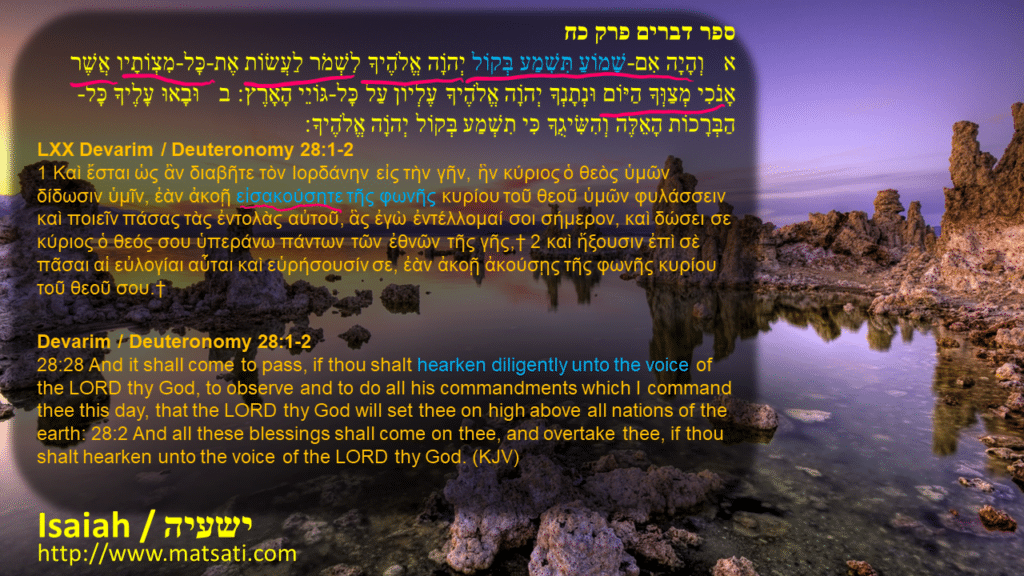
ספר דברים פרק כח
א וְהָיָה אִם-שָׁמוֹעַ תִּשְׁמַע בְּקוֹל יְהוָֹה אֱלֹהֶיךָ לִשְׁמֹר לַעֲשֹוֹת אֶת-כָּל-מִצְוֹתָיו אֲשֶׁר אָנֹכִי מְצַוְּךָ הַיּוֹם וּנְתָנְךָ יְהוָֹה אֱלֹהֶיךָ עֶלְיוֹן עַל כָּל-גּוֹיֵי הָאָרֶץ: ב וּבָאוּ עָלֶיךָ כָּל-הַבְּרָכוֹת הָאֵלֶּה וְהִשִּׂיגֻךָ כִּי תִשְׁמַע בְּקוֹל יְהוָֹה אֱלֹהֶיךָ:
LXX Devarim / Deuteronomy 28:1-2
1 Καὶ ἔσται ὡς ἂν διαβῆτε τὸν Ιορδάνην εἰς τὴν γῆν, ἣν κύριος ὁ θεὸς ὑμῶν δίδωσιν ὑμῖν, ἐὰν ἀκοῇ εἰσακούσητε τῆς φωνῆς κυρίου τοῦ θεοῦ ὑμῶν φυλάσσειν καὶ ποιεῖν πάσας τὰς ἐντολὰς αὐτοῦ, ἃς ἐγὼ ἐντέλλομαί σοι σήμερον, καὶ δώσει σε κύριος ὁ θεός σου ὑπεράνω πάντων τῶν ἐθνῶν τῆς γῆς,† 2 καὶ ἥξουσιν ἐπὶ σὲ πᾶσαι αἱ εὐλογίαι αὗται καὶ εὑρήσουσίν σε, ἐὰν ἀκοῇ ἀκούσῃς τῆς φωνῆς κυρίου τοῦ θεοῦ σου.†
Devarim / Deuteronomy 28:1-2
28:28 And it shall come to pass, if thou shalt hearken diligently unto the voice of the LORD thy God, to observe and to do all his commandments which I command thee this day, that the LORD thy God will set thee on high above all nations of the earth: 28:2 And all these blessings shall come on thee, and overtake thee, if thou shalt hearken unto the voice of the LORD thy God. (KJV)
Here in the LXX we see the aorist, active, subjunctive, second person, plural verb εἰσακούσητε from same stem ἀκούω where Moshe states וְהָיָה אִם-שָׁמוֹעַ תִּשְׁמַע בְּקוֹל יְהוָֹה אֱלֹהֶיךָ “and it will be if you listen to the voice of the Lord your God” and the remainder of the verse, the evidence of the one who listens, is the one who לִשְׁמֹר לַעֲשֹוֹת “keeps and does” all that God commanded for His people is the one who listens to the voice of God. The glory of God is revealed in the pages of the Scriptures, and so we are able to give glory to God, just as we see here in Isaiah 25:6. There is a certain hope for humanity, to those who would believe that hangs upon this text ἐάν τις ἀκούσῃ τῆς φωνῆς μου “if anyone listens to my voice.” Devarim / Deuteronomy 28:2 speaks to the outcome of applying God’s word to our lives! We note this is what it means to give of ourselves to the Lord God in heaven. This also enables Him to give in return to us. This is the idea behind Isaiah 25:6 states, וְעָשָֹה יְהֹוָה צְבָאוֹת לְכָל-הָעַמִּים בָּהָר הַזֶּה מִשְׁתֵּה שְׁמָנִים מִשְׁתֵּה שְׁמָרִים שְׁמָנִים מְמֻחָיִם שְׁמָרִים מְזֻקָּקִים “And in this mountain shall the LORD of hosts make unto all people a feast of fat things, a feast of wines on the lees, of fat things full of marrow, of wines on the lees well refined.” This idea of מִשְׁתֵּ֣ה שְׁמָרִ֑ים שְׁמָנִים֙ מְמֻ֣חָיִ֔ם שְׁמָרִ֖ים מְזֻקָּקִֽים “wines on the lees well refined” is referring to wine that was left to strengthen in the dregs following the fermentation process. Note that wine and rejoicing go hand in hand, and fresh wine is symbolic of a blessing from God that is connected back to the growth of the crops and rain sent from heaven. The wine is strained before drinking, providing a strong wine and this is parallel to fatness and of blessing. The major take away from these Scriptures is to the idea of drawing near, having the proper Kavanah (intension), studying God’s word for the purpose of listening to the voice of God, and sanctifying ourselves in the mitzvot (commands) in this world all of which is done for the glory of God! The weightiness of all of these things is our sanctification that has already taken place before our Father in heaven because of what Yeshua had done on the cross! Having faith in Yeshua and seeking the Lord God in this way leads to our drawing near to Him, and He will draw near to us! This is where transformation begins, when we encounter God through faith and faithfulness by the pages of Scripture and apply His word stepping out in our faith for all to see. This was what Yeshua meant when he said that he stands at the door and knocks ἐάν τις ἀκούσῃ τῆς φωνῆς μου “if anyone listens to my voice,” we note again that Yeshua taught the Torah of God during his earthly ministry, and so when we listen to the voice of the Messiah Yeshua, God’s Holy Spirit comes to dwell in our midst (Torah centric principle) and we will experience the power of God and can trust without a doubt in the promises that God has given to His people according to the Scriptures!
Rabbinic Literature
The Targum Jonathan is a Aramaic and Rabbinic translation of the book of Isaiah and is therefore a valuable resource for the study of Isaiah.
תרגום יונתן בן עוזיאל אל ישעיה פרק כה:א-ו
א יוי אְלָהִי אַת אְרָמְמִינָך אֹודֵי שְמָך אְרֵי עְבַדתָא פְרִישָן מִלכִין דַאְמַרתָא לְאֵיתָאָה מִלְקַדמִין בְכֵין אֵיתִיתָא וְקַייֵמתָא׃ ב אְרֵי שַוִיתָא קִרוֵי פַצחִין לְגַלִין כְרָך תַקִיף לְדִמחַמרַא בֵית דַחלַת עַמְמַיָא בְקַרתָא יְרוּשלַם לְעָלַם לָא יִתבְנֵי׃ ג עַל כֵין יְיַקְרוּן קֳדָמָך עַם תַקִיף קִריַת עַמְמִין חַסִינִין יִדחְלוּן מִן קֳדָמָך׃ ד אְרֵי הְוֵיתַא תְקֹוף לְמִסכֵין סְעֵיד לְחַשִׂיך בְעִדָן עָקָא כְמָא דְמִטַמרִין מִן קֳדָם זָרָמִית כִטלַל מִישְרַב כֵין מִלֵי רַשִיעַיָא לְצַדִיקַיָא כְזָרָמיִת דְשָקְפָא בִכתֹול ה כִשרַב בַאְרַע צָהְיָא אִתרְגֹושַת תַקִיפִין תַמאֵיך כִטלַל כֵיף מַקַר בַאְרַע מְשַלהְיָא כֵין נְיָח רוּחָא לְצַדִיקַיָא כַד יִמאְכוּן רַשִיעַיָא׃ ו וְיַעְבֵיד יוי צְבָאֹות לְכָל עַמְמַיָא בְטוּרָא הָדֵין שֵירוּ וּזמָן מְדַמַן דְהִיא דִיקָר וּתהֵי לְהֹון לִקלַן מַחָן דִילָא יִשתֵיזְבוּן מִנְהֵין מַחָן דִיסוּפוּן בְהֵין׃
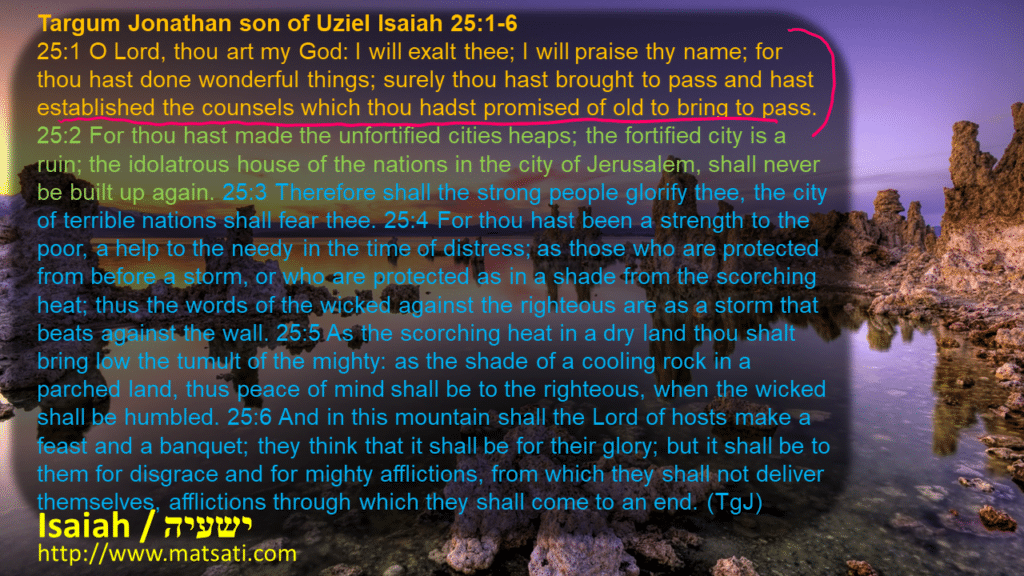
Targum Jonathan son of Uziel Isaiah 25:1-6
25:1 O Lord, thou art my God: I will exalt thee; I will praise thy name; for thou hast done wonderful things; surely thou hast brought to pass and hast established the counsels which thou hadst promised of old to bring to pass. 25:2 For thou hast made the unfortified cities heaps; the fortified city is a ruin; the idolatrous house of the nations in the city of Jerusalem, shall never be built up again. 25:3 Therefore shall the strong people glorify thee, the city of terrible nations shall fear thee. 25:4 For thou hast been a strength to the poor, a help to the needy in the time of distress; as those who are protected from before a storm, or who are protected as in a shade from the scorching heat; thus the words of the wicked against the righteous are as a storm that beats against the wall. 25:5 As the scorching heat in a dry land thou shalt bring low the tumult of the mighty: as the shade of a cooling rock in a parched land, thus peace of mind shall be to the righteous, when the wicked shall be humbled. 25:6 And in this mountain shall the Lord of hosts make a feast and a banquet; they think that it shall be for their glory; but it shall be to them for disgrace and for mighty afflictions, from which they shall not deliver themselves, afflictions through which they shall come to an end. (TgJ)
The TgJ opens Isaiah 25:1 saying, א יוי אְלָהִי אַת אְרָמְמִינָך אֹודֵי שְמָך אְרֵי עְבַדתָא פְרִישָן מִלכִין דַאְמַרתָא לְאֵיתָאָה מִלְקַדמִין בְכֵין אֵיתִיתָא וְקַייֵמתָא׃ 25:1 O Lord, thou art my God: I will exalt thee; I will praise thy name; for thou hast done wonderful things; surely thou hast brought to pass and hast established the counsels which thou hadst promised of old to bring to pass. (TgJ) The exaltation (אְרָמְמִינָך) of God is due to the wonderful things that He has done on behalf of His people. Here it is the result of the Lord God bringing His ancient plans to completion. The idea here is the great mercy and faithfulness of God to His people! The ancient text comparison of this verse Isaiah 25:1 reveals the following:
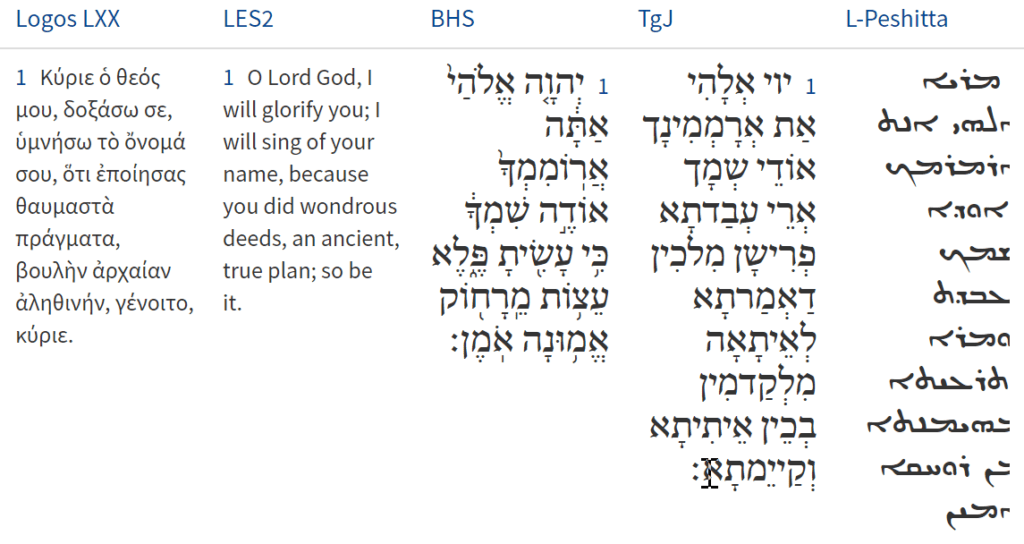
Here the translators of the LXX say “O Lord God, I will glorify you; I will sing of your name, because you did wondrous deeds, an ancient, true plan; so be it.” Here they used the word δόξα to describe the glory of God. In the LXX, the word δόξα is a term that has been applied to both man (i.e. Saul in 1 Samuel 15:30) and to God (i.e. Isaiah 25:1). This word affords one of the clearest examples of semantic change in a Greek word as it came under the influence of the Bible. Derived from δοκέω (“to think,” etc.), δόξα is used with great frequency in the classical period, usually with the meaning “opinion, viewpoint, judgment.” In addition, the term is often used in a passive sense, “reputation;” as a rule the word refers to a person’s good standing, and in some instances, it can be rendered “fame,” “honor,” and even “glory” (e.g. Pindar Ol. 8.64). Therefore, the glory of God is connected to His reputation and character! The noun δόξα occurs well over 400× in the LXX. Remarkably, however, the standard classical meaning “what is thought, opinion, notion” is nowhere to be found, though the sense “reputation” is likely in a few passages (i.e., Isaiah 11:3). Instead, the LXX translators often chose it to render the Hebrew noun כָּבוֹד (glory) and this decision affected significantly the meaning of δόξα. (It should be noted that δόξα is used to render other Hebrew terms.) The verb δοξάζω is found over 120×, often as the rendering of כבד (c. 25×). It is used almost always in the sense “to magnify, praise” just as we see the term being used here in Isaiah 25:1. The conclusion is how δόξα has this dual purpose, of describing or drawing our attention to the reputation and glory of God in heaven.
God is described in this way as the Greek text writes, ὅτι ἐποίησας θαυμαστὰ πράγματα, βουλὴν ἀρχαίαν ἀληθινήν, γένοιτο, κύριε “because you did wondrous deeds, an ancient plan, in faith and faithfulness Lord.” Here God’s βουλὴν ἀρχαίαν “ancient plans,” His purposes are trustworthy and true and so the people can rely upon them! (Tehillim / Psalms 73:24, Isaiah 25:1, Micah 4:12). It should be noted that the divine will or purpose plays a special part in the writings at Qumran which states, “Apart from your will nothing takes place … all that exists is by your will … no one can oppose your will” (1QS XI, 17–19; cf. 1QHa XVIII [= Suk. X], 2, et al.).
Philo and Josephus make frequent use of the word group, esp. the verb βούλομαι (Philo c. 275×, Jos. c. 520×). To a large extent, the references are to human deliberations of various types, but it is not unusual to find βούλομαι applied to the divine will (e.g., Philo Opif. 16 [God “decided” to create the visible world], 149 [God “wished” to see what names Adam would give to the animals]; Deuteronomy 21 [God “determined” to destroy the human race]; Jos. A.J. 1.192 [God “wanted” to keep Abraham’s posterity pure]; 5.218 [God “was willing” to take away Gideon’s fear]; B.J. 4.323 [God “purposed” to cleanse the temple with fire]). (Concise New International Dictionary of New Testament Theology and Exegesis,Grand Rapids, MI: Zondervan Academic, 2021, p241) These things provide us with reasons why knowing God’s plan is so important. How do we get to know God’s plan? Through the study of God’s holy Word, the Bible! When we study the Scriptures, we get the big picture, and what these things in Isaiah are revealing to us is not just about obedience, but how God loves all men, and seeks for all men to repent and turn from their sins!
Ibn Ezra and Rashi write the following concerning Isaiah 25:1:
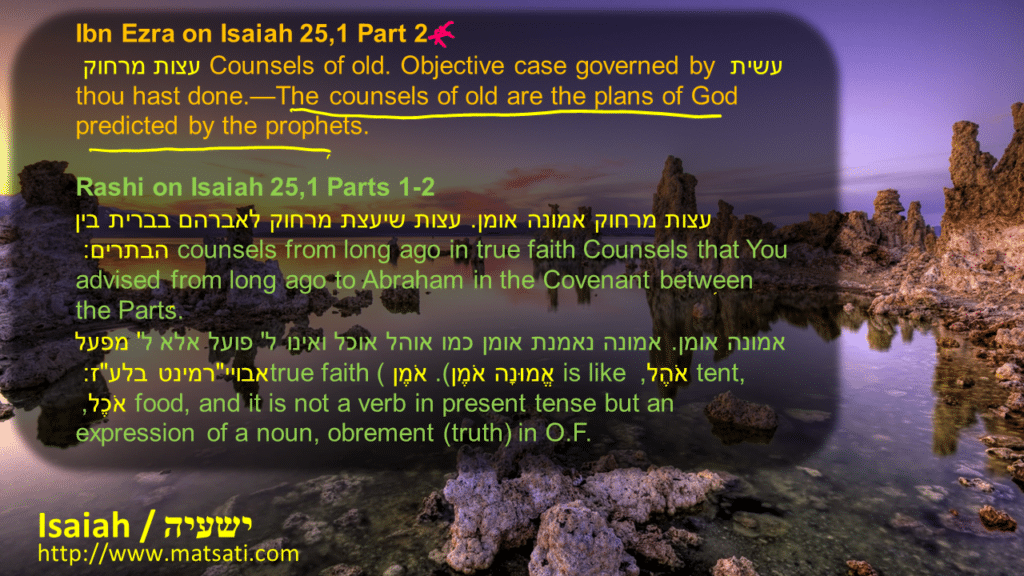
Ibn Ezra on Isaiah 25,1 Part 2
עצות מרחוק Counsels of old. Objective case governed by עשית thou hast done.—The counsels of old are the plans of God predicted by the prophets.Rashi on Isaiah 25,1 Parts 1-2
עצות מרחוק אמונה אומן. עצות שיעצת מרחוק לאברהם בברית בין הבתרים: counsels from long ago in true faith Counsels that You advised from long ago to Abraham in the Covenant between the Parts.
אמונה אומן. אמונה נאמנת אומן כמו אוהל אוכל ואינו ל’ פועל אלא ל’ מפעל אבויי”רמינט בלע”ז: true faith (אֱמוּנָה אֹמֶן). אֹמֶן is like אֹהֶל, tent, אֹכֶל, food, and it is not a verb in present tense but an expression of a noun, obrement (truth) in O.F.
Here Ibn Ezra agrees that these plans of old are given to us via the prophets. It is interesting how the βουλὴν ἀρχαίαν (עֵצ֥וֹת מֵֽרָח֖וֹק) what this implies. The idea of “from old / far” (מֵֽרָח֖וֹק) demonstrates the mercy and grace of God, His long suffering for our benefit, God’s great faithfulness to His people! So, what is the benefit of God’s mercy? In Luke, Yeshua connects the mercy of God to our lives in the following way:
Luke 6:35-36
6:35 But love ye your enemies, and do good, and lend, hoping for nothing again; and your reward shall be great, and ye shall be the children of the Highest: for he is kind unto the unthankful and to the evil. 6:36 Be ye therefore merciful, as your Father also is merciful. (KJV, ܒ݁ܪܱܡ ܐܱܚܶܒ݂ܘ ܠܱܒ݂ܥܶܠܕ݁ܒ݂ܳܒ݂ܰܝ̈ܟܾ݁ܘܢ ܂ ܘܰܐܛܷܐܒ݂ܘ ܠܗܽܘܢ ܂ ܘܰܐܘܙܶܦ݂ܘ ܂ ܘܠܴܐ ܬܷ݁ܦ݂ܣܩܽܘܢ ܣܰܒ݂ܪܴܐ ܕ݁ܐ̱ܢܳܫ ܂ ܘܢܶܗܘܶܐ ܣܰܓܻ݁ܝ ܐܱܓ݂ܪܟ݂ܽܘܢ ܂ ܘܬ݂ܷܗܘܽܘܢ ܒ݁ܢܱ̈ܘܗ̄ܝ ܕ݁ܪܴܡܳܐ ܂ ܕ݁ܗܽܘ ܒܱ݁ܣܺܝܡ ܗ̄ܽܘ ܁ ܥܰܠ ܒܻ݁ܝ̈ܫܶܐ ܘܥܰܠ ܟܴ݁ܦ݂ܽܘܪܷ̈ܐ ܀ܗܘܰܘ ܗܳܟ݂ܺܝܠ ܡܪܱ̈ܚܡܳܢܶܐ ܆ ܐܱܝܟܱ݁ܢܳܐ ܕܴ݁ܐܦ݂ ܐܱܒ݂ܽܘܟ݂ܽܘܢ ܡܪܱܚܡܳܢܳܐ ܗ̄ܘ ܀ 35 πλὴν ἀγαπᾶτε τοὺς ἐχθροὺς ὑμῶν καὶ ἀγαθοποιεῖτε καὶ δανίζετε ⸀μηδὲν ἀπελπίζοντες·* καὶ ἔσται ὁ μισθὸς ὑμῶν πολύς,* καὶ ἔσεσθε υἱοὶ ὑψίστου,* ὅτι αὐτὸς χρηστός ἐστιν ἐπὶ τοὺς ἀχαρίστους καὶ πονηρούς. *36 Γίνεσθε οἰκτίρμονες καθὼς °[καὶ] ὁ πατὴρ ὑμῶν οἰκτίρμων ἐστίν.)
We note that God’s mercy includes peace, good health, love, joy and prosperity. The connection to our lives is in our being merciful as God our Father in heaven is merciful, even to our enemies. This is not a natural thing to do but requires a supernatural influence in our lives by the presence of God dwelling in our midst. When we submit to the merciful ways of God, we are actively choosing to acknowledge these truths in our lives. This is how the psalmist writes according to Tehillim / Psalms 86:15-16 which states, “But you, Lord, are a compassionate and gracious God, slow to anger, abounding in love and faithfulness. Turn to me and have mercy on me; show your strength on behalf of your servant; save me, because I serve you.” (וְאַתָּ֣ה אֲ֭דֹנָי אֵל־רַח֣וּם וְחַנּ֑וּן אֶ֥רֶךְ אַ֝פַּ֗יִם וְרַב־חֶ֥סֶד וֶאֱמֶֽת׃ פְּנֵ֥ה אֵלַ֗י וְחָ֫נֵּ֥נִי תְּנָֽה־עֻזְּךָ֥ לְעַבְדֶּ֑ךָ וְ֝הֹושִׁ֗יעָה לְבֶן־אֲמָתֶֽךָ׃) Here the Psalmist provides an example of his own faithfulness by serving God, living His life according to His Holy Word, calling upon God and His faithfulness, compassion, and love. The point is not one of legalism here, serving the Lord, living according to His word is the outcome of our love for Him. Here the Psalmist is simply crying out for help, seeking the mercy of God in the midst of his troubles.
Isaiah continues according to the TgJ saying, ב אְרֵי שַוִיתָא קִרוֵי פַצחִין לְגַלִין כְרָך תַקִיף לְדִמחַמרַא בֵית דַחלַת עַמְמַיָא בְקַרתָא יְרוּשלַם לְעָלַם לָא יִתבְנֵי׃ 25:2 For thou hast made the unfortified cities heaps; the fortified city is a ruin; the idolatrous house of the nations in the city of Jerusalem, shall never be built up again. (TgJ) Here Jonathan interprets the heaps and ruins being described here as those who were involved in idolatrous worship, saying they will never be built up again. Rash interprets these things in the following way:
Rashi on Isaiah 25,2 Parts 1-2
כי שמת. הר שעיר מעיר לגל: For You have made Mount Seir from a city into a heap.
ארמון זרים מעיר. מעון שעשו בעירך שהחריבוה תתן ארמונותיה חורבן אשר לעולם לא יבנה: a palace of strangers, because of the city Because of the iniquity they committed in Your city, that they destroyed it, You shall make its palaces a ruin, which shall never be rebuilt.
Rashi interprets the meaning of the verses as referring to Mount Seir (שֵׂעִיר, se’ir). Mount Seir is a mountainous region between the Dead Sea and Gulf of Aqabah. In biblical times, this area marked the border between Judah and Edom. Seir (Hebrew: “hairy”) has been inhabited since around 2000 BC, according to archaeological surveys (Avi-Yonah, “Seir,” 255). Seir is located southeast of Israel, near the wilderness of Zin, with mountains reaching a height of 5,776 feet. (5280 feet = 1 mile) With the second-highest average rainfall (15.75 inches) in the entire Transjordan region, Seir is well-watered and partially wooded. In the middle of this hill country sits the iconic Nabatean archaeological and tourist site, Petra, as well as Jebel Haroun (Mount of Aaron).

The Bible makes 38 references to Seir, most of them occurring in the Torah. The earliest appearance comes in Bereshit / Genesis 14:6, which describes the Horites as living in the hill country of Seir. Seir often appears to be synonymous with Edom. Esau is said to have settled in Seir (Bereshit / Genesis 32:4), and his descendants, the Edomites, continued to reside there (Devarim / Deuteronomy 2:4). Seir and Edom are used in parallel in Balaam’s oracle (Bamidbar / Numbers 24:18), and both places are mentioned in the description of Judah’s territory (Joshua 15:1 and 15:10). Later, kings Jehoshaphat and Amaziah lead the Israelites against the people of Seir (2 Chronicles 20:22-23, 25:11). When Amaziah strikes down the Edomites, he captures the gods “of the sons of Seir” (2 Chronicles 25:14). Prophecies in Isaiah and Ezekiel refer to Seir often negatively (e.g Ezekiel 35:2-3, 35:7), but sometimes neutrally (e.g., Isaiah 21:11). (Dougald McLaurin III and Amy L. Balogh, “Seir, Hill Country of,” ed. John D. Barry et al., The Lexham Bible Dictionary, Bellingham, WA: Lexham Press, 2016). Rashi says it was because of their iniquity (sin) the city was destroyed and made to be a ruin and a heap of rubble. These things should be an everlasting reminder to not allow unrepentant sin to continue in our lives and seek the Lord God our Father in heaven and Yeshua the Messiah for deliverance and the power to overcome!
Isaiah continues saying the following according to Isaiah 25:3-6, ג עַל כֵין יְיַקְרוּן קֳדָמָך עַם תַקִיף קִריַת עַמְמִין חַסִינִין יִדחְלוּן מִן קֳדָמָך׃ 25:3 Therefore shall the strong people glorify thee, the city of terrible nations shall fear thee. ד אְרֵי הְוֵיתַא תְקֹוף לְמִסכֵין סְעֵיד לְחַשִׂיך בְעִדָן עָקָא כְמָא דְמִטַמרִין מִן קֳדָם זָרָמִית כִטלַל מִישְרַב כֵין מִלֵי רַשִיעַיָא לְצַדִיקַיָא כְזָרָמיִת דְשָקְפָא בִכתֹול 25:4 For thou hast been a strength to the poor, a help to the needy in the time of distress; as those who are protected from before a storm, or who are protected as in a shade from the scorching heat; thus the words of the wicked against the righteous are as a storm that beats against the wall. ה כִשרַב בַאְרַע צָהְיָא אִתרְגֹושַת תַקִיפִין תַמאֵיך כִטלַל כֵיף מַקַר בַאְרַע מְשַלהְיָא כֵין נְיָח רוּחָא לְצַדִיקַיָא כַד יִמאְכוּן רַשִיעַיָא׃ 25:5 As the scorching heat in a dry land thou shalt bring low the tumult of the mighty: as the shade of a cooling rock in a parched land, thus peace of mind shall be to the righteous, when the wicked shall be humbled. ו וְיַעְבֵיד יוי צְבָאֹות לְכָל עַמְמַיָא בְטוּרָא הָדֵין שֵירוּ וּזמָן מְדַמַן דְהִיא דִיקָר וּתהֵי לְהֹון לִקלַן מַחָן דִילָא יִשתֵיזְבוּן מִנְהֵין מַחָן דִיסוּפוּן בְהֵין׃ 25:6 And in this mountain shall the Lord of hosts make a feast and a banquet; they think that it shall be for their glory; but it shall be to them for disgrace and for mighty afflictions, from which they shall not deliver themselves, afflictions through which they shall come to an end. (TgJ) A number of concepts may be drawn out from the TgJ rendition of Isaiah. The people glorify God because of his mercy to the poor and needy. We note how these are concepts that are drawn out in NT text where the source text is the Tanakh, i.e. on the mercy of God who protects, and the Lord functioning as a wall around those who trust in Him. The wicked are those who oppress other men, and Isaiah says that the wicked will be humbled. The TgJ writes that that He will make a feast and a banquet in his holy mountain, paralleling the MSS “And in this mountain shall the LORD of hosts make unto all people a feast of fat things, a feast of wines on the lees, of fat things full of marrow, of wines on the lees well refined.” (וְעָשָֹה יְהֹוָה צְבָאוֹת לְכָל-הָעַמִּים בָּהָר הַזֶּה מִשְׁתֵּה שְׁמָנִים מִשְׁתֵּה שְׁמָרִים שְׁמָנִים מְמֻחָיִם שְׁמָרִים מְזֻקָּקִים) Rashi interprets Isaiah 25:5 saying the following:
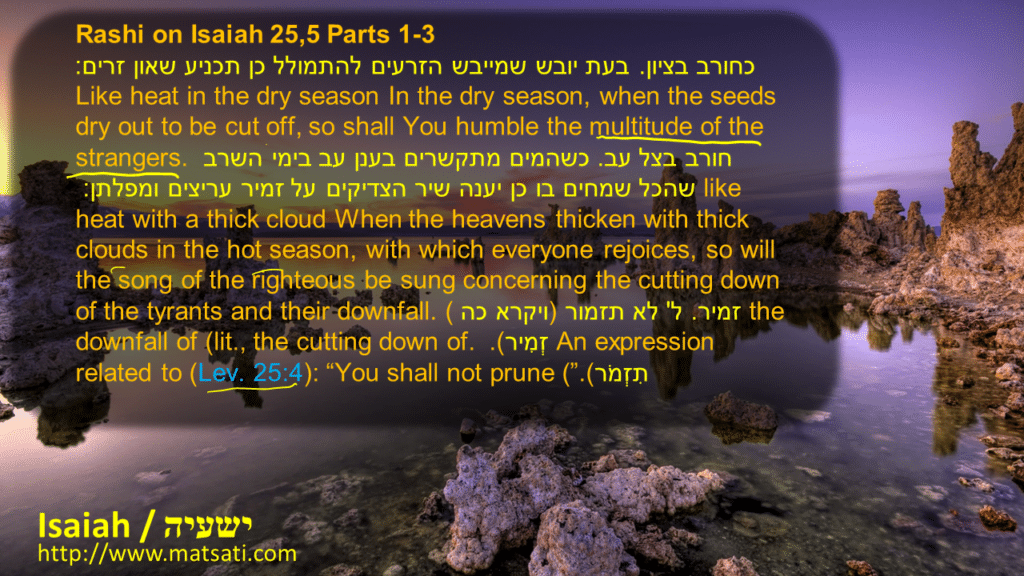
Rashi on Isaiah 25,5 Parts 1-3
כחורב בציון. בעת יובש שמייבש הזרעים להתמולל כן תכניע שאון זרים: Like heat in the dry season In the dry season, when the seeds dry out to be cut off, so shall You humble the multitude of the strangers. חורב בצל עב. כשהמים מתקשרים בענן עב בימי השרב שהכל שמחים בו כן יענה שיר הצדיקים על זמיר עריצים ומפלתן: like heat with a thick cloud When the heavens thicken with thick clouds in the hot season, with which everyone rejoices, so will the song of the righteous be sung concerning the cutting down of the tyrants and their downfall. (זמיר. ל’ לא תזמור (ויקרא כה the downfall of (lit., the cutting down of. זְמִיר). An expression related to (Lev. 25:4): “You shall not prune (תִזְמֹר).”
The idea here is that the wicked which are called “the multitude of strangers” will be cut off in a manner that parallels the heat and withering seedlings. The righteous will sing while the wicked are cut down in the imagery of the Lord God Almighty pruning down a plant, so will be the downfall of the wicked, it will not be something of their choice, but however the Lord God Almighty chooses to do. These things speak to God forever being faithful and how his Chesed (grace) endures forever. According to the Scriptures, the Lord God Almighty is the Creator, King, Judge, and Redeemer. Most importantly He is our Father who profoundly loves us as His children. God’s compassion and love for His people is portrayed here in Isaiah 25:3-6, of His love for the helpless and needy, and for being a refuge for strength and safety. The various metaphors throughout the Tanakh and the Apostolic Writings reveal our relationship with God is like a marriage, where the Lord God is our husband, lover, and friend. God created and redeemed us for the sake of His everlasting love that He expresses towards us which are revealed from the pages of the Torah, the Prophets, and the Writings! For this purpose, the Lord God Almighty sent His Son Yeshua, to demonstrate to us to the greatest extent the kind of Love that God has for us, that one would lay his life down for another! This is the amazing story that is recorded and preserved for us so that we can have faith, and believe, and then walk in God’s commands by the greatness of His power and presence in our lives! As the LXX states, Κύριε ὁ θεός μου, δοξάσω σε “Oh Lord God, I glorify you!” we-to say this because of His great love, mercy, and grace! What a wonderful God we serve!
